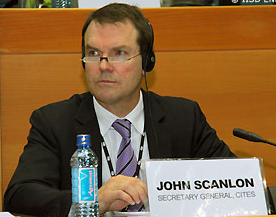In a statement delivered at the UNEP GCSS-12/GMEF, CITES Secretary-General highlighted that UNEP's comparative advantage is not in providing administrative services but in providing programmatic, financing and UN system-wide support.
He suggested that UNEP could assist conventions with access to funding through the GEF and also help with linking the science required to implement conventions to capacity building.
 March 2012: In a statement delivered during the 12th Special Session of the UN Environment Programme (UNEP) Governing Council/Global Ministerial Environment Forum (GCSS-12/GMEF), John Scanlon, Secretary-General, Convention on International Trade In Endangered Species of Wild Fauna and Flora (CITES), offered suggestions related to the issue of the institutional framework for sustainable development (IFSD).
March 2012: In a statement delivered during the 12th Special Session of the UN Environment Programme (UNEP) Governing Council/Global Ministerial Environment Forum (GCSS-12/GMEF), John Scanlon, Secretary-General, Convention on International Trade In Endangered Species of Wild Fauna and Flora (CITES), offered suggestions related to the issue of the institutional framework for sustainable development (IFSD).
Scanlon highlighted that the “zero draft” of the outcome document for the UN Conference on Sustainable Development (UNCSD, or Rio+20) references two options for strengthening the environmental side of sustainable development: a specialized agency for the environment; or strengthening the capacity of UNEP, including through universal membership. He noted that coordination and cooperation among conventions are often approached from the perspective of synergies among the secretariats that service the conventions, which is also the focus of the zero draft. He suggested that synergies should be addressed from a perspective that includes programmatic synergies, financing synergies and synergies within the UN-system and beyond.
In looking at synergies, he highlighted that UNEP’s comparative advantage is not in providing administrative services, but in providing programmatic, financing and UN system-wide support. He proposed that UNEP should focus on its strengths, such as implementing conventions at the regional and national levels. Scanlon underlined that UNEP could assist conventions with enhancing linkages to regional processes, assisting with access to funding through the Global Environment Facility (GEF), involving the various convention national focal points in the revision of National Biodiversity Strategy Action Plans (NBSAPs), and linking the science required to implement conventions to the capacity building anticipated under the Intergovernmental Platform on Biodiversity and Ecosystem Services (IPBES). [CITES Secretary-General’s Statement]